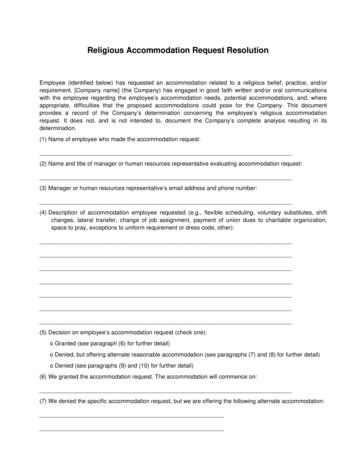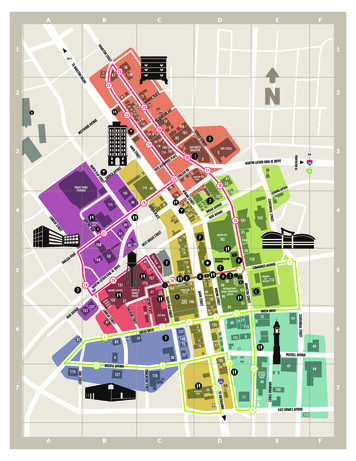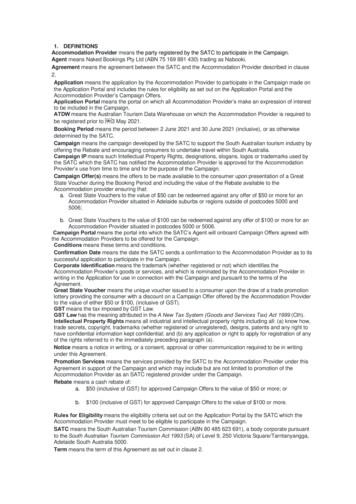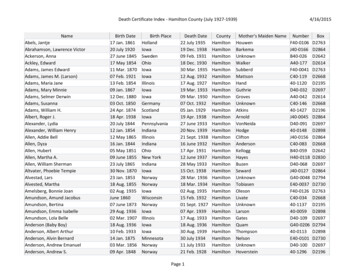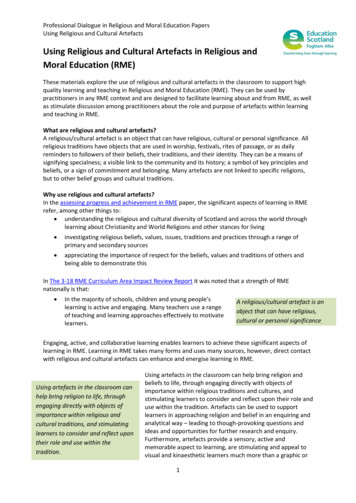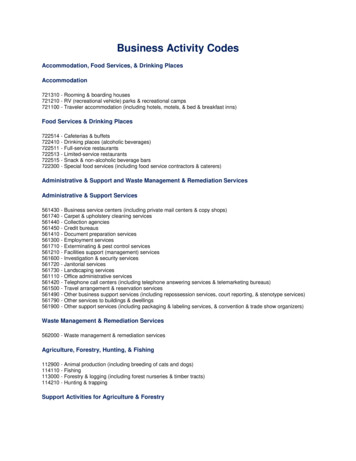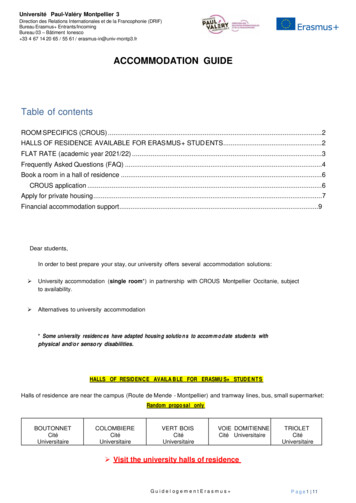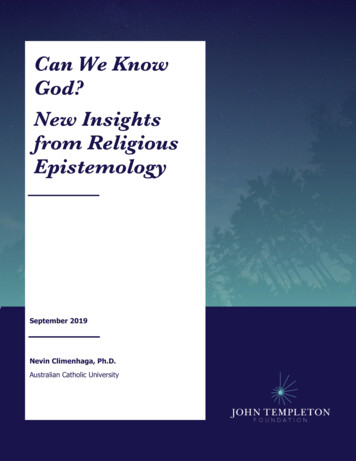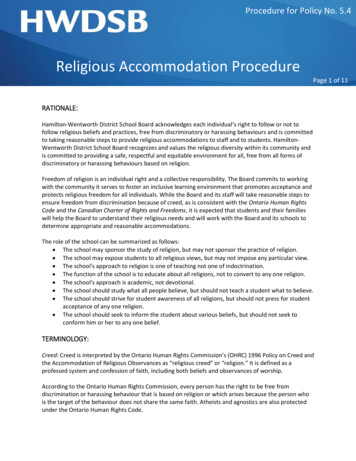
Transcription
Procedure for Policy No. 5.4Religious Accommodation ProcedurePage 1 of 11RATIONALE:Hamilton-Wentworth District School Board acknowledges each individual’s right to follow or not tofollow religious beliefs and practices, free from discriminatory or harassing behaviours and is committedto taking reasonable steps to provide religious accommodations to staff and to students. HamiltonWentworth District School Board recognizes and values the religious diversity within its community andis committed to providing a safe, respectful and equitable environment for all, free from all forms ofdiscriminatory or harassing behaviours based on religion.Freedom of religion is an individual right and a collective responsibility. The Board commits to workingwith the community it serves to foster an inclusive learning environment that promotes acceptance andprotects religious freedom for all individuals. While the Board and its staff will take reasonable steps toensure freedom from discrimination because of creed, as is consistent with the Ontario Human RightsCode and the Canadian Charter of Rights and Freedoms, it is expected that students and their familieswill help the Board to understand their religious needs and will work with the Board and its schools todetermine appropriate and reasonable accommodations.The role of the school can be summarized as follows: The school may sponsor the study of religion, but may not sponsor the practice of religion. The school may expose students to all religious views, but may not impose any particular view. The school's approach to religion is one of teaching not one of indoctrination. The function of the school is to educate about all religions, not to convert to any one religion. The school's approach is academic, not devotional. The school should study what all people believe, but should not teach a student what to believe. The school should strive for student awareness of all religions, but should not press for studentacceptance of any one religion. The school should seek to inform the student about various beliefs, but should not seek toconform him or her to any one belief.TERMINOLOGY:Creed: Creed is interpreted by the Ontario Human Rights Commission’s (OHRC) 1996 Policy on Creed andthe Accommodation of Religious Observances as “religious creed” or “religion.” It is defined as aprofessed system and confession of faith, including both beliefs and observances of worship.According to the Ontario Human Rights Commission, every person has the right to be free fromdiscrimination or harassing behaviour that is based on religion or which arises because the person whois the target of the behaviour does not share the same faith. Atheists and agnostics are also protectedunder the Ontario Human Rights Code.
Procedure for Policy No. 5.4Religious Accommodation ProcedurePage 2 of 11This Procedure does not extend to religions that incite hatred or violence against other individuals orgroups, or to practices and observances that purport to have a religious basis, but which contraveneinternational human rights standards or criminal law (Policy on Creed and the Accommodation ofReligious Observances, Ontario Human Rights Commission, October 20, 1996, pg. 5).Discrimination: Discrimination on the basis of creed includes any distinction, exclusion, restriction, orpreference based on religion or belief whose purpose or effect is the nullification of human rights andfundamental freedoms on an equal basis or the impairment of said rights and freedoms(Policy on Creed and the Accommodation of Religious Observances, Ontario Human RightsCommission, October 20, 1996).Harassment because of creed is a form of discrimination. Such harassment involves conduct orcomments concerning religious beliefs or practices which are known or ought to be known to beoffensive. Even a single incident of such behaviour may constitute harassment and may create apoisoned environment where it is serious enough.Discrimination can be direct or indirect.Direct discrimination includes any action which unlawfully differentiates between persons because oftheir membership in a protected group. Direct discrimination is absolutely prohibited unless theOntario Human Rights Code provides a specific exception which permits the discrimination. It should benoted that whether there was an intention to discriminate is irrelevant in the case of directdiscrimination. However, not every distinction is discrimination.Indirect discrimination may be constructive or the result of an adverse effect. Indirect discrimination isless apparent than direct discrimination. It is a disadvantage or adverse impact which may result fromthe uniform application of a requirement, factor or rule.Adverse effect discrimination encompasses action which is not on its face discriminatory, but which hasthe effect of adversely affecting a group identified by a prohibited ground of discrimination. Sometimesthe action taken is directed towards a legitimate objective. If so, the discrimination may be allowed tocontinue so long as reasonable efforts have been made to accommodate the adversely affected group,having regard to needs of both the person obliged to accommodate and the group beingaccommodated. Again, there may be specific statutory exceptions which permit adverse effectdiscrimination.Pursuant to section 11(1) of the Code, constructive discrimination occurs when a requirement,qualification, or factor that is neutral on its face results in the exclusion, restriction, or preference of agroup of persons who are identified by a prohibited ground of discrimination under the code.
Procedure for Policy No. 5.4Religious Accommodation ProcedurePage 3 of 11Due to this adverse impact, such requirements, qualifications or other factors are said to result inconstructive discrimination.Accommodation: The Ontario Human Rights Commission’s Policy on Creed and the Accommodation ofReligious Observances defines “accommodation” as a duty corresponding to the right to be free fromdiscrimination:The Ontario Human Rights Code provides the right to be free from discrimination, and there is ageneral corresponding duty to protect the right: the “duty to accommodate.” The duty ariseswhen a person’s religious beliefs conflict with a requirement, qualification or practice. TheOntario Human Rights Code imposes a duty to accommodate based on the needs of the group ofwhich the person making the request is a member. Accommodation may modify a rule or make anexception to all or part of it for the person requesting accommodation. (Policy on Creed and theAccommodation of Religious Observances, Ontario Human Rights Commission, October 20, 1996,pg. 5)The duty to accommodate is an obligation that arises when requirements, factors, or qualifications,which are imposed in good faith, have an adverse impact on, or provide an unfair preference for, agroup of persons based on a protected ground under the Ontario Human Rights Code. The duty toaccommodate is assessed utilizing a reasonableness standard.Accommodation, if required, will be provided unless the needs of the person cannot be accommodatedwithout undue hardship. In determining whether there is undue hardship, section24(2) of the Ontario Human Rights Code provides that reference should be made to an assessment ofthe cost of accommodation, outside sources of funding, and health and safety requirements. The Courtshave recognized that additional factors may also be considered when assessing undue hardship.PROCEDURES:1.0General Accommodation Guidelines:Accommodation Based on Request1.1The Board is committed to providing an environment that is inclusive and free of barriersbased on creed (religion). The principles of dignity, individual situation and inclusion will beconsidered when determining reasonable accommodation requirements. The Board will workcooperatively, and in a spirit of respect, with all partners in the accommodation process.
Procedure for Policy No. 5.4Religious Accommodation ProcedurePage 4 of 11The Board will take reasonable steps to provide accommodation to individual members of areligious group to facilitate their religious beliefs and practices. All accommodation requestswill be taken seriously. No person will be penalized for making an accommodation request. TheBoard will base its decision to accommodate by applying the Ontario Human Rights Code’scriteria of undue hardship, applicable Board policies, the Education Act and other relevantstatutory requirements.Unresolved Requests1.22.0Despite the Board’s commitment to consider reasonable accommodation, an individual mayfeel that discrimination based on religion has occurred which has not been resolved at theschool level. The Board will take reasonable and timely steps to address any and all suchunresolved issues raised by the affected person which could include a dispute resolutionmechanism. This may include the appropriate supervisory officer, school administrator, schooland system staff. As part of the dispute resolution process, the affected individual may chooseto bring an advocate for support. Faith group representatives from the HWDSB Inter-faithAdvisory Committee may also be consulted where appropriate understanding privacyconsiderations must be respected.Responsibilities for Accommodation:It is the role of the Board and its staff to ensure equity and respect for the diverse religiousbeliefs and practices of students and their families as well as other staff in the school system.Staff2.1The person requesting accommodation should advise administration prior to the school year,to the extent possible. If not feasible, the person should make the request as early as possible.When concerns related to beliefs and practices arise in schools, collaboration among school,student, family, and religious community is needed in order to develop appropriateaccommodation.However, school administrators do not monitor a child’s compliance with a religiousobligation, and/or enforce such practices, e.g. performing daily prayers or wearing a headcovering is not the responsibility of the school or the Board.
Procedure for Policy No. 5.4Religious Accommodation ProcedurePage 5 of 11Students2.23.0Students who are under 18 and have not withdrawn from parental control must presentwritten notice from their parents/guardians specifying their accommodation needs relating toreligious observances, including any holy days on which they will be absent from school. Thisnotice should be made enough in advance (preferably at the beginning of each school year) toensure that scheduling of major evaluations, such as tests, assignments or examinations, takesthe religious observances into consideration.Areas of Accommodation:For many students and staff of the Board, there are a number of areas where the practice oftheir religion will result in a request for accommodation on the part of the school and/or theBoard. These areas include, but are not limited to, the following:3.13.23.33.43.53.63.73.8School Opening and Closing exercisesLeave of Absence for Religious Holy DaysPrayerDietary RequirementsFastingReligious DressModesty Requirements in Physical Education ClassesParticipation in Daily Activities and CurriculumEach of the above-stated areas of accommodation will be considered in turn:School Opening and Closing exercises3.1Pursuant to PPM No. 108, if a student or parent/guardian objects to all or part of the openingor closing exercises due to religious beliefs, that student will be exempted and given the optionnot to participate and either remain in class or in an agreed upon location through theduration of the exercise.PPM No. 108 states the following:1. All public elementary and secondary schools in Ontario must be opened or closed eachday with the national anthem. “God Save the Queen” may be included.2. The inclusion of any content beyond “O Canada” in opening or closing exercises is tobe optional for public school boards.3. Where public school boards resolve to include, in the opening or closing exercises intheir schools, anything in addition to the content set out in item 1 above, it must becomposed of either or both of the following:
Procedure for Policy No. 5.4Religious Accommodation ProcedurePage 6 of 11a) One or more readings that impart social, moral, or spiritual values and that arerepresentative of our multicultural society. Readings may be chosen from bothscriptural writings, including prayers, and secular writings;b) A period of silence.4. Parents who object to part or all of the exercises may apply to the principal to havetheir children exempted. Students who are adults may also exercise such a right. Theserequirements will be interpreted in accordance with the Ontario Human Rights Codeand the Board will consider other requests for accommodation as may be made.Leave of Absence for Religious Holy Days3.2HWDSB is committed to affirming and valuing equally, the faith diversity in our schools.Section 21(2) (g) of the Education Act provides that a person is excused from schoolattendance in observance of a “holy day by the church or religious denomination to whichhe/she belongs.” This requirement will be interpreted in accordance with the Ontario HumanRights Code.Absences requested for religious observances are assessed under this Procedure, the OntarioHuman Rights Code and the appropriate collective agreement.All staff and students who observe religious holidays in accordance with section 21(2) (g) ofthe Education Act may be excused from school attendance, subject to provisions in theappropriate collective agreements (for staff). The Board will encourage members ofdifferent faith-based groups to identify their religious holy days at the beginning of eachschool year. The Board will make reasonable efforts to acknowledge the differentobservances of their community when planning programs and events, such as Board-widetests and examinations. If practical, conferences, meetings, workshops, co-curricularactivities and exams/tests, will not be scheduled on these faith days:Baha’iBuddhistWestern ChristianEastern ChristianHinduJewishMuslimSikh(Examples of) Faith Days:RidvánLunar New Year/Chinese New YearGood FridayChristmasDiwaliRosh Hashanah (2 days)Eid-ul-FitrBaisakhi(A multi-faith calendar will be provided on a yearly basis to help schools make appropriateaccommodations.)
Procedure for Policy No. 5.4Religious Accommodation ProcedurePage 7 of 11 Guidelines for Administrators and Managers When Considering Requests for Holy DayAbsencesIn accordance with their rights, all staff and students who request to observe a religious holyday should be allowed this right without having to undergo any unnecessary hardship.Staff requesting a leave should advise the school administration prior to the school year, to theextent possible, and leave should be granted in accordance with the terms of the appropriatecollective agreement and as may be required under the Ontario Human Rights Code.Students who are under 18 and have not withdrawn from parental control requesting a leaveshould give written notice from their parent/guardian to the school prior to the school year, tothe extent possible. Such procedures should be easy to understand and followStudent agendas, school newsletters and announcements should include information aboutthe procedures for requesting leaves.All staff members acting on behalf of/representing the Board on other organizations, which inpartnership with the Board are planning events or activities that involve students and/or staffof Board schools, have the responsibility to bring this procedure to the attention of theseorganizations.Administrators and managers should contact the appropriate Superintendent of Education forconsultation or further clarification. Guidelines for Administrators and Managers in Addressing Unresolved Requestsa) EmployeeIn the event that, after an employee’s consultation with the school administration andthe Superintendent of Education, unresolved issues remain, the matter will then bereferred to the Superintendent of Human Resources.b) StudentsIn the event that a student maintains that his or her rights under the Board’s EquityPolicy Procedure for the Provision of Religious Accommodation in HWDSB Schoolshave been compromised, the matter will then be referred to the appropriateSuperintendent of Education.
Procedure for Policy No. 5.4Religious Accommodation ProcedurePage 8 of 11Prayer3.3The significance of prayer in religious practice is recognized. Board schools will makereasonable efforts to accommodate individuals’ requirement for daily prayer by providing anappropriate location within the building for students and staff to participate in prayer. Thismay mean a quiet space in the library, an empty room, or wherever it is mutually satisfactoryfor the school and the student or staff member requesting the accommodation. Particularaccommodation for prayer may include but is not limited to late school arrival, early schoolleaving or seasonal adjustment. Adult presence should be for supervision purposes only.Dietary Requirements3.4Different dietary requirements of various religious groups are acknowledged. Such sensitivityincludes attending to issues related to the menus provided by catering companies, snacks inelementary schools, and food provided within schools, at school-sponsored activities andcommunity events.Breakfast and lunch programs in both secondary and elementary schools will consider relevantdietary requirements in their menu planning. Availability of vegetarian options isrecommended as a form of inclusive design.Special attention needs to be given to overnight outdoor education activities, as well as fieldtrips that extend over a meal time period.Parents/students should also have a means to identify dietary requirements in writing.Fasting3.5Religious periods of fasting is acknowledged. Board schools will endeavour to provideappropriate space, other than cafeterias or lunchrooms, for individuals who are fasting inreligious observance. The Board recognizes that students who are fasting may needexemptions from certain physical education classes and schools should make reasonableefforts to provide appropriate accommodations.Religious Dress3.6A “Dress Code” is the appropriate dress policy established by a school, and may include aschool uniform. Such policies should be designed inclusively, taking into account commonreligious needs that may exist.
Procedure for Policy No. 5.4Religious Accommodation ProcedurePage 9 of 11The Board recognizes that there are certain religious communities that require specific itemsof ceremonial dress. The Board understands that some religious attire, which is a requirementof religious observance, may not conform to a school’s Dress Code. Board schools willreasonably accommodate students with regard to religious attire as may be required by law.Religious attire is not cultural dress; it is a requirement of religious observation.Religious attire that should be reasonably accommodated in Board schools includes, but is notlimited to: Headcovers: Yarmulkes, turbans, Rastafarian headdress and hijabs Crucifixes, Stars of David, crosses etc. Items of ceremonial dressWhere uniforms are worn, administrators may ask the student to wear religious attire in thesame colour as the uniform (e.g. head scarves for females); however, there may be religiousrequirements of colour that cannot be modified.Special attention must be given to accommodations necessary for a student to participate inphysical education and school organized sports. Where possible, these should be incorporatedinto Board policies as part of an inclusive design process.The Board seeks to foster an atmosphere of cultural understanding in order to be proactive inaddressing potential harassment about religious attire. Schools should be aware thatharassment about religious attire is one of the most common types of harassment andbullying. The Board and its schools will not tolerate any teasing directed at, or inappropriateactions, or any other form of bullying related to an individual’s religious attire. There will beappropriate consequences for individuals who violate this rule.Modesty Requirements in Physical Education Classes3.7The Board recognizes that some religious communities observe strict modesty attire in respectof their religion. This can become a matter of concern when students are asked to wear theclothing used in physical education activities. Such policies should be designed inclusively,taking into account common religious needs that may exist.If a family has concerns that cannot be addressed through inclusive design, the school shoulddiscuss the modesty requirements with them taking into consideration the Ministry ofEducation’s mandated expectations in the physical education curriculum. The curriculumrequirements should be explained to the family so that the family has sufficient information tounderstand the physical education curriculum and to select available curriculum alternatives.
Procedure for Policy No. 5.4Religious Accommodation ProcedurePage 10 of 11Participation in Daily Activities and Curriculum3.8HWDSB will reasonably accommodate students where there is a demonstrated conflictbetween a specific class or curriculum and a religious requirement or observance. Whereacademic accommodation is requested, the school should have an informed discussion withthe student’s parents/guardians or the student if he/she is an adult, to understand the natureand extent of the conflict.The school should make it clear during the discussion that its role is to protect students andstaff from harassment and discrimination because of their religion and cultural practices.Where such practices conflict with the school routines and activities or curriculum, the schoolshould consider accommodation. It cannot, however, accommodate religious values andbeliefs which clearly conflict with mandated Ministry of Education and Board policies.It is important to note that where an individual requests an accommodation related to thecurriculum, the accommodation applies only to the individual in question and not to the wholeclass or to classroom practices in general.The Ministry of Education recommends substitutions when there are exemptions requestedthat are related to specific curriculum (Ontario Secondary Schools, Grades 9-12, Program andDiploma Requirements).In general, the Board recommends an informed, reasonable approach to questions of religionand curriculum. An open discussion between the teacher, the student and his/her family canhopefully resolve questions.4.0Limitations to Religious Accommodations4.1The Board is committed to preventing discrimination and harassment based on enumeratedgrounds set out in the Ontario Human Rights Code within its school community. This includesdiscrimination on the basis of creed. The Board supports freedom of religion and anindividual’s right to manifest his/her religious beliefs and observances.4.2The right to freedom of religion, however, is not absolute. Decisions will be made inaccordance with the principles of the Ontario Human Rights Code. The Board will limit anypractices or behaviour in its schools which may put public safety, health, or the human rightsand freedoms of others at risk. As well, the Board will limit practices or behaviours in itsschools that are in violation of Ministry of Education and other Board policies.
Procedure for Policy No. 5.4Religious Accommodation ProcedurePage 11 of 115.0Communication to Parents Regarding Religious Accommodation5.1Oral and written communication including student handbooks and parent newsletters shouldinclude information about the procedure to follow to request an accommodation for religiousobservances and/or holy days. Such procedures should be easy for staff, students and parentsto understand.5.2Communications to parents should be made available in various formats and languages.5.3Corporate Communications will post this Procedure on the Board’s website for public access.6.0Professional Development6.1The Board will provide staff development opportunities and resources in the area of religiousaccommodation for trustees and all employee groups.6.2Schools and Service Departments will identify staff development needs to enable thoseresponsible for implementation of the Procedure to provide support as appropriate.7.0Monitor and Review7.1Feedback will be gathered with all stakeholder groups as deemed appropriate.
The school's approach is academic, not devotional. The school should study what all people believe, but should not teach a student what to believe. . e.g. performing daily prayers or wearing a head covering is not the responsibility of the school or the Board. Procedure for Policy No. 5.4 Religious Accommodation Procedure Page 5 of 11 .

